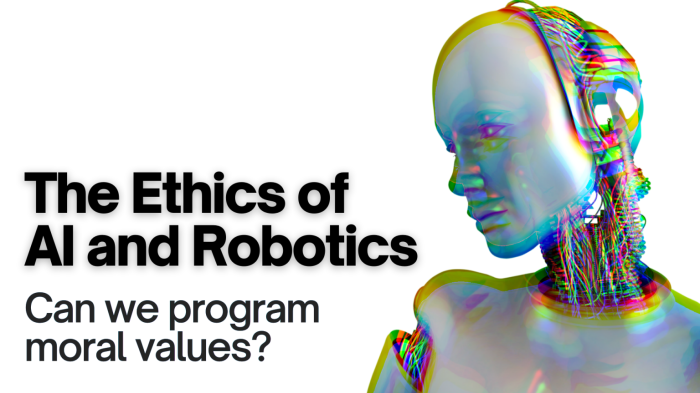The ethical implications of artificial intelligence in news reporting are as complex as the algorithms themselves. Imagine a world where news articles are written by machines, fact-checking is automated, and news feeds are curated by algorithms that know us better than we know ourselves.
This is the future of news, and it raises a host of ethical questions about trust, bias, and the very nature of truth in a digital age.
From the potential for AI-generated misinformation to the concerns about algorithmic bias shaping our news consumption, this journey into the intersection of AI and journalism will explore the challenges and opportunities that lie ahead. We’ll delve into the potential for AI to enhance reporting, but also consider the risks of creating a news landscape that is more controlled, less transparent, and potentially even more divided.
AI-Generated Content and its Impact on Trust and Accuracy
The rise of artificial intelligence (AI) has brought about a new era in content creation, particularly in news reporting. AI algorithms can now generate news articles that are remarkably similar to human-written content, raising concerns about the impact on trust and accuracy.
This section explores the potential of AI-generated content, its ethical implications, and how AI can be used to ensure the authenticity of news sources.
The Potential for AI to Generate Realistic News Content, The ethical implications of artificial intelligence in news reporting
AI algorithms, trained on vast amounts of text data, can mimic human writing styles and generate news articles that are nearly indistinguishable from human-written content. This capability is fueled by advancements in natural language processing (NLP) and machine learning techniques.
For instance, OpenAI’s GPT-3 can produce coherent and grammatically correct news articles on various topics, even simulating different writing styles. This raises concerns about the authenticity of news content, as it becomes increasingly difficult to discern between human-written and AI-generated articles.
Ethical Implications of AI-Generated Content
The use of AI-generated content in news reporting presents significant ethical challenges. A primary concern is the potential for AI to be used to spread misinformation and bias. Since AI algorithms learn from existing data, they can inherit biases present in the training data.
This can lead to the generation of biased or misleading news articles, potentially manipulating public opinion or fueling social divisions. Furthermore, the lack of transparency in AI algorithms can make it difficult to identify and address potential biases, further amplifying concerns about the ethical use of AI in news reporting.
AI’s Role in Verifying News Authenticity
While AI can be used to generate news content, it can also be employed to verify the authenticity of news sources and content. AI-powered fact-checking tools can analyze text, images, and videos to identify potential inconsistencies or fabrications. For example, Google’s fact-checking tool uses AI to cross-reference information with various sources and identify discrepancies.
This technology can help combat the spread of misinformation and ensure the credibility of news reporting.
Advantages and Disadvantages of AI-Generated Content in News Reporting
AI-generated content offers several advantages, including increased efficiency and speed in news production. AI algorithms can generate news articles quickly, allowing news organizations to publish content more frequently and adapt to breaking news events. However, there are also disadvantages to consider.
The lack of human judgment and oversight in AI-generated content can lead to errors and inaccuracies. Additionally, relying solely on AI-generated content can diminish the role of human journalists in investigative reporting and critical analysis.
AI-Powered Fact-Checking and Verification
The rise of artificial intelligence (AI) has brought about a new era of automated fact-checking and verification in news reporting. While this technology holds immense potential for improving the accuracy and reliability of information, it also presents a unique set of ethical challenges.
Ethical Challenges of AI Fact-Checking
The use of AI in fact-checking raises ethical concerns, particularly in terms of bias, transparency, and accountability.
- Bias in AI algorithms:AI algorithms are trained on massive datasets, and if these datasets contain biases, the AI system will inherit and amplify those biases. This can lead to inaccurate or unfair fact-checking results, perpetuating existing societal prejudices.
- Transparency and accountability:It is crucial to understand how AI algorithms work and to ensure transparency in their decision-making processes. Without transparency, it becomes difficult to identify and address potential biases or errors.
- Over-reliance on AI:Over-reliance on AI for fact-checking can lead to a reduction in human judgment and critical thinking. It’s important to maintain a balance between AI-powered tools and human oversight.
Potential for AI Bias in News Reporting
AI systems can perpetuate existing biases in news reporting by:
- Reinforcing existing narratives:AI algorithms may be trained on datasets that reflect existing biases, leading to the reinforcement of dominant narratives and the suppression of alternative viewpoints.
- Filtering information based on biases:AI systems can be used to filter information based on predetermined criteria, potentially excluding information that challenges existing biases.
- Generating biased content:AI-powered content generation tools can be used to create news articles that reflect existing biases, further perpetuating these biases.
AI for Identifying and Flagging Misinformation
AI can play a significant role in identifying and flagging potential misinformation in news articles by:
- Cross-referencing information:AI can compare information in news articles with reliable sources to identify inconsistencies or discrepancies.
- Detecting patterns of misinformation:AI can analyze large amounts of data to identify patterns of misinformation, such as the use of fake accounts or the spread of false claims.
- Identifying manipulated content:AI can be used to detect manipulated images, videos, or audio recordings that are often used to spread misinformation.
Hypothetical Scenario: AI Verification of a Breaking News Story
Imagine a breaking news story about a major political scandal. An AI-powered fact-checking system could be used to verify the accuracy of the story by:
- Cross-referencing with official statements:The AI system could compare the information in the news story with official statements from government agencies or political figures.
- Analyzing social media activity:The AI system could analyze social media posts and comments to identify potential sources of misinformation or disinformation.
- Identifying inconsistencies:The AI system could identify any inconsistencies or contradictions within the news story itself or with other credible sources.
AI and the Future of Journalism
The world of news is rapidly changing, and AI is at the forefront of this transformation. From automating mundane tasks to generating compelling content, AI is poised to revolutionize how we consume and produce news.
The Role of AI in News Reporting
AI is expected to play a pivotal role in news reporting, automating tasks, enhancing efficiency, and even generating content. This is not about robots replacing journalists entirely, but rather about augmenting their capabilities and allowing them to focus on more complex and creative tasks.
- Automated Content Generation:AI can analyze vast amounts of data and generate basic news reports, particularly for data-heavy topics like financial markets or sports scores. This frees up journalists to focus on investigative reporting and in-depth analysis.
- Personalized News Experiences:AI algorithms can curate personalized news feeds based on individual user preferences, making news more relevant and engaging. This could lead to a more diverse and nuanced media landscape, catering to different interests and perspectives.
- Enhanced Fact-Checking and Verification:AI tools can quickly cross-reference information from multiple sources, identify inconsistencies, and flag potential misinformation. This helps journalists maintain accuracy and credibility in their reporting.
- Visual Storytelling:AI can analyze and process large datasets to create interactive graphics, maps, and animations, enhancing the storytelling capabilities of news organizations.
The Impact of AI on Journalism Jobs
While AI is expected to automate certain tasks, it’s unlikely to replace journalists entirely. Instead, AI will likely shift the focus of journalism towards higher-level skills like critical thinking, analysis, and storytelling.
- Shifting Skillset:Journalists will need to adapt their skills to work alongside AI, focusing on areas like data analysis, ethical considerations, and creative storytelling.
- New Roles and Opportunities:AI will create new roles for journalists, such as AI ethics specialists, data analysts, and content curators.
- Focus on Human Expertise:AI will enhance the capabilities of journalists, allowing them to focus on areas where human expertise is essential, such as investigative reporting, interviewing, and nuanced analysis.
Ethical Considerations of AI in Newsrooms
As AI plays a more prominent role in newsrooms, ethical considerations become paramount. Transparency, accountability, and bias detection are crucial for maintaining trust and credibility.
- Transparency and Disclosure:It’s crucial to be transparent about the use of AI in news production. This includes disclosing when AI is used to generate content and ensuring that readers understand the limitations of AI-generated information.
- Bias Detection and Mitigation:AI algorithms can inherit biases from the data they are trained on. It’s essential to develop methods for detecting and mitigating these biases to ensure fair and unbiased reporting.
- Accountability and Oversight:Establishing clear guidelines and mechanisms for accountability is vital. This includes defining roles and responsibilities for human oversight of AI systems in newsrooms.
Timeline of AI Development in News Reporting
AI is already impacting news reporting, and this trend is expected to accelerate in the coming years. Here’s a potential timeline outlining key developments:
| Year | Development |
|---|---|
| 2023-2025 | Increased adoption of AI-powered tools for content creation, fact-checking, and audience engagement. |
| 2026-2028 | Emergence of more sophisticated AI models capable of generating more nuanced and complex news content. |
| 2029-2031 | AI plays a central role in personalized news experiences, with tailored content and interactive formats becoming more prevalent. |
| 2032-2034 | AI-powered newsrooms become more commonplace, with a greater focus on human-AI collaboration and ethical considerations. |
AI and Personalization in News Consumption

Imagine a world where your newsfeed is tailored to your specific interests, like a personalized newspaper delivered directly to your digital doorstep. This is the promise of AI-powered news personalization, where algorithms analyze your reading habits, social media interactions, and even your location to curate a news experience that’s uniquely yours.
The Use of AI in Personalizing News Recommendations
AI algorithms can analyze your past news consumption, identifying patterns and preferences to predict what you might be interested in reading. They can also track your social media activity, analyzing your likes, shares, and comments to understand your political leanings, cultural interests, and even your stance on specific issues.
This information is then used to recommend articles, videos, and other news content that aligns with your interests.
You also will receive the benefits of visiting Overcome limiting beliefs and negative thoughts for positive mindset today.
Ethical Implications of AI-Driven News Filtering
The ethical implications of AI-powered news filtering are significant. While it can offer a more engaging and relevant news experience, it can also create filter bubbles, isolating users within their own echo chambers and limiting their exposure to diverse perspectives.
This can contribute to polarization and a lack of understanding of different viewpoints.
Potential Biases in AI-Powered News Personalization
AI algorithms are trained on massive datasets, and these datasets can reflect existing societal biases. This can lead to biased news recommendations, reinforcing existing prejudices and limiting exposure to diverse voices. For example, an algorithm trained on data from a predominantly conservative news source might disproportionately recommend articles from conservative outlets, potentially creating a filter bubble for users who are already inclined towards that viewpoint.
Benefits and Drawbacks of AI-Driven News Personalization
- Benefits:
- Increased engagement:Personalized news recommendations can make news consumption more engaging by presenting users with content they are more likely to be interested in. This can lead to greater knowledge retention and a more informed public.
- Time efficiency:By filtering out irrelevant content, AI-powered news personalization can save users time and effort, allowing them to focus on the news that matters most to them.
- Exposure to niche topics:Personalized news recommendations can introduce users to niche topics and perspectives that they might not have encountered otherwise.
- Drawbacks:
- Filter bubbles:Personalized news recommendations can create filter bubbles, isolating users within their own echo chambers and limiting their exposure to diverse perspectives.
- Bias amplification:AI algorithms can amplify existing biases, leading to a more polarized and fragmented news landscape.
- Reduced critical thinking:Reliance on personalized news recommendations can reduce critical thinking skills, as users may be less likely to question the information they are presented with.
Algorithmic Bias and its Impact on News Reporting
Algorithms, the invisible hands that shape our online experiences, are increasingly used in news reporting. While they offer the promise of efficiency and personalization, they also carry the risk of amplifying existing biases, potentially distorting our understanding of the world.
The Potential for Algorithmic Bias
Algorithmic bias refers to the systematic and unfair discrimination against certain groups of people by algorithms. This bias can stem from various sources, including the data used to train the algorithms, the design of the algorithms themselves, and the human biases of the developers.
In news reporting, this can lead to the suppression of certain stories or the amplification of others, ultimately shaping public opinion in unintended and potentially harmful ways.
Examples of Algorithmic Bias in News Reporting
- Search Engine Results:Algorithms used by search engines can prioritize certain news sources over others, potentially leading to the suppression of diverse perspectives or the amplification of biased content. Imagine a search for “climate change” that consistently returns articles from climate change denial groups, while ignoring credible scientific sources.
This can create a distorted picture of the issue for users.
- Social Media Algorithms:Social media algorithms, designed to keep users engaged, can prioritize content that aligns with their existing beliefs and preferences. This can lead to the creation of echo chambers, where users are only exposed to information that confirms their existing biases, further polarizing public opinion.
- News Recommendation Systems:Algorithms used by news aggregators and personalized news apps can recommend stories based on users’ past behavior, potentially limiting their exposure to new perspectives or challenging information. This can lead to a narrow and biased understanding of current events.
Ethical Implications of Algorithmic Bias
Using algorithms that perpetuate existing biases raises serious ethical concerns. It can:
- Undermine Trust in Journalism:When news reporting is influenced by biased algorithms, it erodes public trust in journalism as a source of reliable information. This can lead to a decline in civic engagement and a weakening of democratic institutions.
- Amplify Social Divisions:Biased algorithms can exacerbate existing social divisions by reinforcing stereotypes and limiting exposure to diverse perspectives. This can contribute to a climate of intolerance and conflict.
- Create a Misinformation Ecosystem:Biased algorithms can contribute to the spread of misinformation and disinformation by prioritizing content that confirms existing biases or by promoting false information as credible news. This can have a detrimental impact on public discourse and decision-making.
Mitigating Algorithmic Bias in News Reporting
- Transparency and Accountability:News organizations should be transparent about the algorithms they use and the data they rely on. This allows for independent scrutiny and helps to build trust with the public.
- Diverse Training Data:Algorithms should be trained on diverse datasets that reflect the full range of human experiences and perspectives. This can help to reduce bias and ensure that algorithms are fair and equitable.
- Regular Audits and Monitoring:Algorithms should be regularly audited and monitored for bias. This involves identifying and addressing potential biases in the algorithms themselves and in the data they are trained on.
- Human Oversight:Algorithms should not be used in isolation. Human journalists should play a crucial role in overseeing the output of algorithms and ensuring that it is accurate, fair, and balanced.
AI and the Role of Human Journalists
The rise of artificial intelligence (AI) has brought about a paradigm shift in the field of journalism, prompting a reassessment of the role of human journalists. While AI tools can automate certain tasks, human journalists remain indispensable for their unique skills and perspectives.
The Evolving Role of Human Journalists
The advent of AI has not rendered human journalists obsolete but has rather reshaped their role. AI tools can handle tasks such as data analysis, content generation, and fact-checking, freeing up human journalists to focus on more complex and nuanced aspects of reporting.
- Investigative Journalism:AI can assist in sifting through vast amounts of data to uncover hidden patterns or connections, which human journalists can then investigate further. For example, AI algorithms can analyze social media data to identify potential sources for investigative stories.
- Narrative Storytelling:Human journalists excel at crafting compelling narratives that resonate with audiences. AI can provide data and insights, but it is the human journalist who can weave these elements into a captivating story that informs and engages readers.
- Critical Thinking and Analysis:AI can provide information and insights, but it lacks the ability to critically analyze information, understand context, and draw nuanced conclusions. This requires human judgment and experience.
AI as a Complement to Human Journalists
AI can be a powerful tool for journalists, augmenting their abilities and enhancing their work.
- Data Visualization:AI can transform complex data into easily digestible visualizations, such as charts and graphs, making it easier for journalists to present information to their audience.
- Translation and Localization:AI-powered translation tools can help journalists reach a wider audience by translating content into multiple languages.
- Content Curation:AI can help journalists identify and curate relevant content from various sources, saving them time and effort.
Leveraging AI for Enhanced Reporting
Human journalists can leverage AI to enhance their reporting in various ways.
- Fact-Checking:AI tools can help journalists verify the accuracy of information by cross-referencing sources and detecting potential biases.
- Audience Insights:AI can analyze data on audience demographics, interests, and preferences, providing journalists with insights into what their readers want to see.
- Personalized Content:AI can be used to create personalized news feeds that cater to individual readers’ interests, enhancing their engagement with the content.
Strengths and Weaknesses of Human Journalists and AI
The following table compares the strengths and weaknesses of human journalists and AI in news reporting:
| Feature | Human Journalists | AI |
|---|---|---|
| Strengths | Critical thinking, creativity, empathy, nuanced understanding of context, ethical judgment, ability to build relationships with sources | Speed, efficiency, data analysis, accuracy in fact-checking, ability to process large amounts of information, objectivity |
| Weaknesses | Susceptibility to bias, limited capacity for data analysis, potential for errors, time-consuming research, limited reach | Lack of critical thinking, empathy, and understanding of context, potential for bias in algorithms, inability to build relationships with sources, limited creativity |
Privacy Concerns in AI-Powered News Reporting
The integration of artificial intelligence (AI) into news reporting has brought about a wave of innovation, enhancing efficiency and providing new avenues for information dissemination. However, this technological advancement has also raised significant concerns regarding the privacy of individuals whose data is used in AI-powered news platforms.The use of AI in news reporting involves the collection and analysis of vast amounts of user data, including browsing history, social media activity, and location data.
This data is used to personalize news feeds, target advertising, and generate insights into user preferences. While this can be beneficial for both users and news organizations, it also raises concerns about the potential misuse of this sensitive information.
Potential Risks to User Privacy
AI-powered news platforms can pose potential risks to user privacy if not implemented and used responsibly. These risks include:
- Data Breaches:AI systems rely on large datasets, making them vulnerable to cyberattacks and data breaches. This can lead to the unauthorized access and disclosure of sensitive user information, such as personal details, financial information, and browsing history.
- Profiling and Discrimination:AI algorithms can be used to create detailed profiles of users based on their online behavior and preferences. This information can be used to target users with specific content, including biased or discriminatory news stories.
- Surveillance and Tracking:AI-powered news platforms can track user activity across multiple devices and platforms, creating a comprehensive picture of their online behavior. This can be used for targeted advertising or even surveillance purposes.
Ethical Considerations
The ethical considerations surrounding the collection and use of user data in news reporting are paramount. News organizations have a responsibility to ensure that user data is collected and used ethically and transparently. This includes:
- Informed Consent:Users should be informed about the data being collected, how it will be used, and their options for opting out.
- Data Minimization:Only the necessary data should be collected and used for specific purposes.
- Data Security:Robust security measures should be implemented to protect user data from unauthorized access and breaches.
- Transparency:News organizations should be transparent about their data collection and use practices.
AI for Privacy Protection
While AI can pose privacy risks, it can also be used to protect user privacy in news reporting. Some ways AI can be used to enhance privacy include:
- Differential Privacy:This technique adds noise to data to make it difficult to identify individual users while still allowing for statistical analysis.
- Data Anonymization:Sensitive user data can be anonymized to remove identifying information before it is used for analysis or reporting.
- Privacy-Preserving Machine Learning:This approach allows AI models to be trained on data without directly accessing or storing sensitive user information.
Outcome Summary: The Ethical Implications Of Artificial Intelligence In News Reporting
As AI continues to evolve, the ethical considerations surrounding its use in news reporting will only become more critical. Finding a balance between innovation and responsibility is paramount. We need to ensure that AI is used to enhance the quality of journalism, not to erode public trust.
The future of news depends on it.
Questions and Answers
What are some real-world examples of AI-generated news content?
Several news organizations have experimented with AI-generated content, including the Associated Press (AP) which uses AI to generate short news reports on topics like corporate earnings.
How can journalists use AI to improve their reporting?
AI tools can help journalists research, analyze data, and even identify potential sources. They can also help automate tasks like fact-checking and translation, freeing up journalists to focus on more in-depth reporting.
What are some potential solutions to mitigate algorithmic bias in news reporting?
Solutions include increased transparency in algorithms, diverse training data sets, and human oversight to ensure fairness and accuracy.
 CentralPoint Latest News
CentralPoint Latest News




